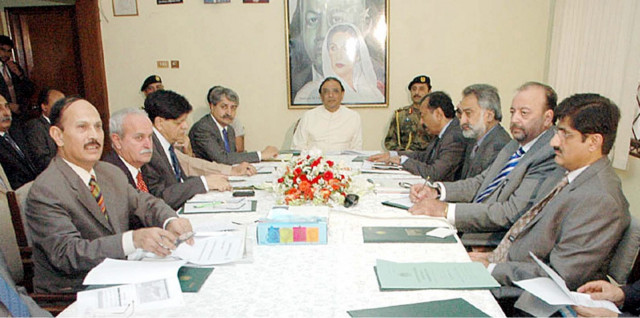Zulfikarabad: from ‘useless state land’ to ‘productive asset’

The president chaired two meetings at Bilawal House, reviewed the progress on the new city and discussed the industrial and agricultural demonstration zones in the province.
After the meetings, the president’s spokesperson Farhatullah Babar informed the media that the Zulfikarabad project should be completed soon as there is a huge influx of national and international migrants to Karachi and Hyderabad. There is enough strain on the existing infrastructure of the two cities and Zulfikarabad should be able to relieve them.
President Zardari asked the provincial government to design the new city so that it was equipped with the latest infrastructure and facilities. It should be a new city and completely separate from the greater Karachi, Babar quoted the president as saying.
The Zulfikarabad Development Authority Ordinance 2010 was promulgated last week to establish the new city in District Thatta as a port city, said Babar, adding that the authority has been tasked with preparing a master plan and one for the city’s development.
The meeting was informed that Expressions of Interest will be invited from international consultants for the basic design concept. President Zardari asked the chief minister to keep him posted on the progress made in the project.
Sources said that during the meeting the president was angry that Zulfikarabad work was being delayed. According to sources, the Board of Revenue’s Ghulam Ali Pasha told the president that the Sindh Management Development Company has been set up to develop the city. The company will be advertising very soon to attract investment with preferences being given to China and Korea.
The city will be spread over 328,000 acres and will cover four tehsils - Kharo Chan, Jati, Shah Bander and Keti Bandar.
Locals will be given priority for land ownership. Most of the land belongs to the government, but compensation will be given to people who have been living there for years.
After the meeting, while speaking to the media, economist and Advisor Dr Kaisar Bengali said that the federal government had announced that it was devolving different federal departments and projects to the Sindh government, but the province didn’t have the resources to manage. “After the NFC award we will get around Rs70 billion extra but we need Rs770 billion if all departments are given to us,” he said.
Under these conditions, most of the projects being run by the federal government will be wound up.
Hybrid seeds for agriculture
According to President Zardari, new hybrid seeds of wheat, rice and cotton should be tested from all angles to assess their suitability for the local environment.
It is important to develop high-yielding new varieties of major crops to not only overcome shortages but also to help Pakistan export food grains.
“Our yield per acre is one of lowest in the world and there is great potential to increase it using hybrid seed technology,” said the president.
President Zardari was impressed by the advances made by China in hybrid seed technology and believed that there is a great deal to learn from their experience.
“During my visits to China, I found Chinese hybrid technology very advanced and more importantly they were more than willing to share it with our farmers,” he said. The meeting was informed that hybrid rice had already been grown in agricultural demonstration zones and trials were underway.
Construction of dams
New dams should be built as soon as possible so that there is enough water for irrigation and consumption, said President Zardari.
Poor women must be empowered through free distribution of state lands in the command areas of the new dams, he believed.
He directed the provincial government to take up the issue of providing housing to the poor and he requested a separate briefing on the progress made in the Benazir Behan Basti programme. This programme is aimed at providing low-cost housing units to poor people in remote areas of Sindh.
Published in The Express Tribune, July 23rd, 2010.


















COMMENTS
Comments are moderated and generally will be posted if they are on-topic and not abusive.
For more information, please see our Comments FAQ